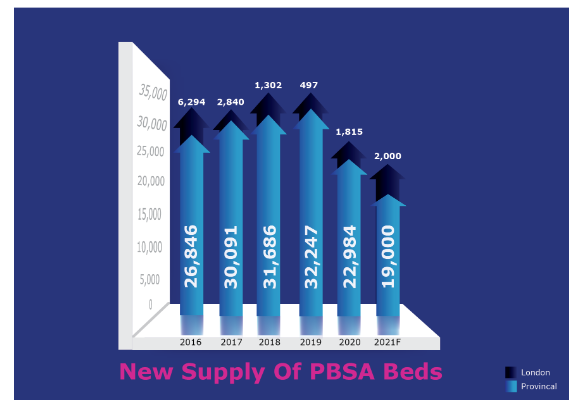The Ultimate Guide to Student Accommodation
Student Housing
5 mins read
Share

Updated at: 16 December, 2024
Published at: 13 January, 2023
By Reem Mohamed
The Ultimate Guide to Student Accommodation
Student Housing
5 mins read

Updated at: 16 December, 2024
Published at: 13 January, 2023
By Reem Mohamed
Share
Here’s the scenario: you've made the decision to travel and pursue your education abroad, congratulations! You’re now in the process of familiarising yourself with everything you need to know before making that decision a reality. You check for universities, visa requirements, and everything in between. You’ve now landed at the student accommodation part of your research, and you are not sure where to start. Leave this part up to us!
Student accommodation, especially for an international student in a totally foreign country, can be a scary concept. This is why we, at Casita, have come up with a comprehensive guide to get you acquainted with the whole process from start to finish. So, prepare all the questions you might have regarding student accommodation and let’s see how many of them we answer in this ultimate guide to student accommodation!
What is Student Accommodation?
Student accommodation is basically the student’s home throughout their study period. Student accommodation is specifically equipped and tailored to the student's overall needs and priorities. Most often, student accommodation options are located in close proximity to a university or institution or generally located in a student neighbourhood.
Student accommodation options come in different types with options both on and off campus. Here are some of the most prominent types of student accommodation for you to consider when starting your booking process.
Types of Student Accommodation
On-Campus Accommodation
This type of student accommodation is typically found on-campus and is managed by the university or institution you’re enrolled in. On-campus accommodation provides students with housing throughout the semester and comes with several pros and cons, let’s explore some of them!
Pros
Location: Living in on-campus student accommodation puts you right next to your classes and administrative buildings, making your commute almost non-existent.
Facilities: On-site accommodation teams, laundry facilities, fitness centres, high-speed Wi-Fi, and other amenities can be found in on-campus housing.
Community: On-campus student accommodation has the perk of living with people who are sharing the same experience as you, thus allowing you to socialise and widen your circle of friends.
Price: On-campus accommodation is generally cheaper than off-campus accommodation, however, this mainly depends on the university itself as well as the current housing rates.
Cons
Summer Stays: Since this accommodation is located on campus, most, if not all, on-campus accommodation options do not allow students to stay during the summer, forcing international students to find another place to stay during this period.
Limited Exposure: Having everything on campus is both a blessing and a curse. On the one hand, you have everything you need right under your nose, and on the other hand, you get little to no contact with the outside world, which limits your study abroad experience.
Off-campus Accommodation
Off-campus accommodation has so many different types, each comes with its own sets of pros and cons, here are the ones you need to get acquainted with!
Private
A private let or private accommodation generally is a property managed by a single person and not a provider or an entity. In most cases, these privately owned accommodation options are not usually categorized as student accommodation since they lack some of the main features, and non-students can rent them as well.
Pros
Price: It is cheaper to rent a room in private accommodation than it is in an on-campus facility or other accommodation types.
Variety: A private let is not limited by location or room type; you can rent whatever room you want wherever you want and have a variety of options to choose from.
Short Stays: If you are staying for a short period of time in a city, for example throughout the duration of a course and not an entire semester, then these would come in handy. Private accommodation has short-term contracts and allows you to stay for your desired period of time.
Plus Ones: Most student accommodation options do not allow for you to have a plus one in your room, especially if they’re not a student. This is not the case in private accommodation as it allows you to live with whomever you want.
Last-Minute Booking: If you are in a time crunch, private lets are a great option to book last minute.
Cons
Safety: While private accommodation can be safe, it is not as safe as other accommodation types like PBSAs or on-campus accommodation.
Student-Friendliness: Since it’s not originally designed with students in mind, private accommodation may not be as student-friendly as other types of accommodation and might lack some of the facilities.
Co-living
Co-living or purpose-built shared living space (PBSL) is the concept of sharing a living space with one or more other individuals. Each student would typically have a private room, but a common kitchen, a utility space, and a lounge area.
Pros
Flexibility: An ultimate benefit of co-living spaces is the flexibility it has flexible leases and allows you to opt-out of your tenancy whenever you need.
Services: Contrary to popular belief, co-living spaces are in fact equipped and serviced, so they include useful facilities and amenities to facilitate your stay.
Community: Similar to on-campus accommodation, living in a co-living space helps you form bonds and socialise with people of different backgrounds and cultures.
Price: This is one of the most affordable options when it comes to student accommodation.
Cons
Privacy: You might not have access to your own private space as much as you would in other types of accommodation. This can have a negative effect on you, especially if you’re an introvert or if you require peace and quiet to get things done.
Student Friendliness: Again, similar to private accommodation, co-living spaces are not exactly tailored to students and their lifestyles so they might lack some of the facilities.
PBSA
Purpose-built student accommodation (PBSA) is a type of student accommodation that is designed with the student in mind. It is a type of private housing that provides apartments or studios as well as shared living spaces for university students. The services and facilities included in these living spaces are tailored to cater for students in higher education with communal study areas, 24/7 security, and laundry facilities.
Recently, Purpose-built student accommodation buildings have become even more luxurious and they’ve added entertainment facilities as well, including games areas, cinema rooms, spas, swimming pools, and even gym facilities. There are even some PBSAs that offer on-site cafes or grocery stores with some providing free breakfast for students.
Pros
Student Friendly: PBSAs are built with the student in mind and are therefore equipped with everything students might need, making their stay easy and guiding them throughout their study period.
Location: In terms of location, PBSAs are located close to universities or institutions or generally in a student-friendly neighbourhood, thus making the student’s commute easier.
Safety: This is considered one of the safest options for student accommodation. PBSAs are often fitted with on-site security teams and are CCTV monitored.
All-inclusive: Most PBSAs have utility bills included in the rent, meaning you don’t have to pay several bills, just a single weekly or monthly one covering rent, heating, electricity, water, gas, and Wi-Fi.
Community: This is yet another type of student accommodation that helps students bond with other people and grants them a sense of belonging and community.
Cons
Price: Some PBSAs fall on the pricier side of student accommodation, however, most of the time the rates are flexible and can be subject to change due to discounts or offers.
Flexibility: Unlike private accommodation and co-living spaces, some PBSAs have less flexible leases that might be harder to opt out of if needed.
Student Housing
By Reem Mohamed
Share
Student Housing
Updated at:
Published at:
By Reem Mohamed
Share


